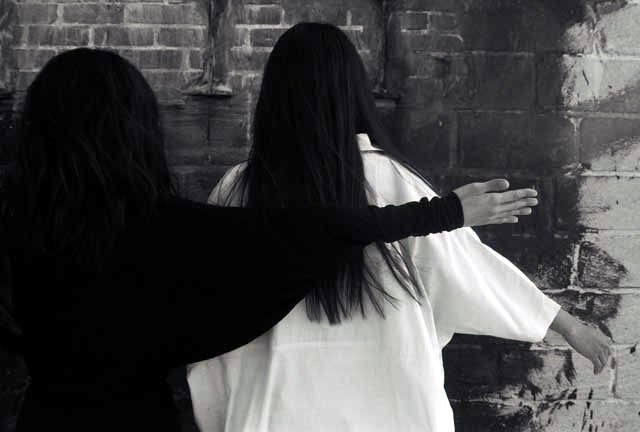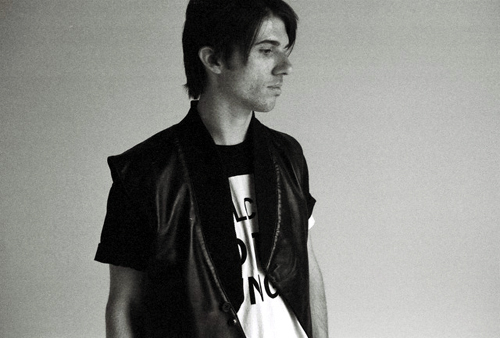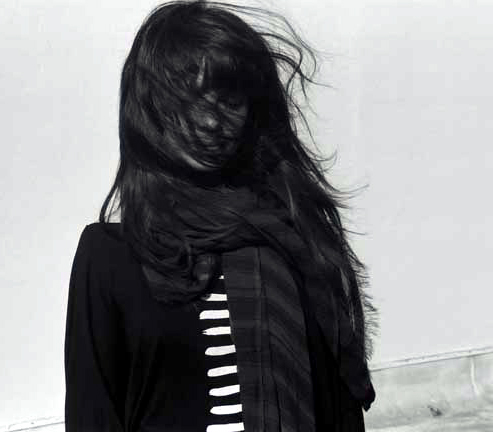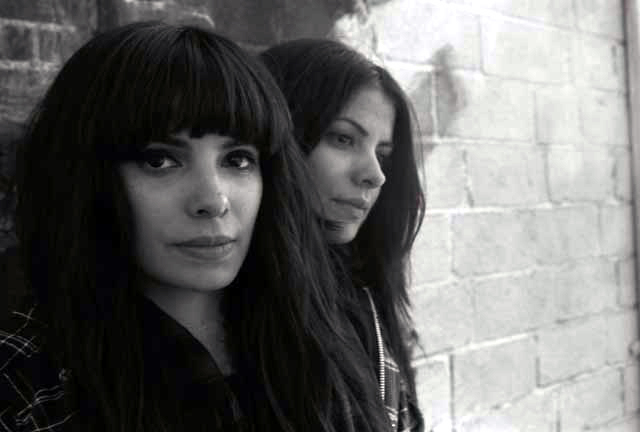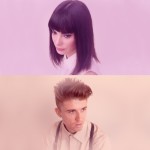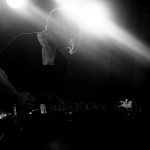[Photos by Winona Barton-Ballatine; live photo by Aaron Richter]
Interview by Andrew Parks
The first thing that struck us about School of Seven Bells was how undeniably alien their sound is. Familiar elements are everywhere–beats that are about to boil over; guitars that grind drums to dust; synths that glisten like the noontime sun–but they coalesce in a manner few, if any, could have predicted given the trio’s Secret Machines/On!Air!Library! pedigee.
We won’t bother trying to give such a gray, genre-less area of psychedelic-something-or-other a name. However, we did have a lengthy conversation with 2/3 of our cover co-stars at d.b.a. (Claudia Deheza was m.i.a.), one that touches upon everything from the undisputed brilliance of Robert Wyatt to the hyper-sensitivity that comes from reing the reviews of clueless critics.
[audio:http://www.self-titledmag.com/wp-content/uplos/audio4/07%20Connjur.mp3]School of Seven Bells, “Connjur”
“Garage Band, in my opinion, is the most rical thing that’s happened to music, culturally, ever.”
self-titled: Tell me a little bit about the recording process for Alpinisms. A lot of the songs on it went through drastically different versions over the past couple years, right? How did you decide what you’d run with on the final album?
Benjamin Curtis: We did the whole session from scratch, actually. There’s no more than two or three versions of a song out there : That’s the weird thing about music now and being able to record by yourself. You have to watch it because first drafts get off the ground at a really vanced state, sonically. It’s not like the Tascam four-track anymore. You have to be very deliberate about what you do and say–about what you think is rey to be heard–because it’s so easy to record a song now.
The process is very immediate.
BC: It’s so immediate because you don’t have to book studio time.
Alejandra Deheza: Well, you don’t need a producer anymore. All of these programs are designed for normal people, for a kid at a bedroom in NYU to make a record.
BC: We learned a lot between when we started the band and Alpinisms came out. It was a total crash course in home recording, and the final exam was Alpinisms.
Did you ever stop and think you could really use a producer for a certain part?
BC: There were points of frustration where we felt like we couldn’t do something ourselves. We didn’t want to do something sub-par, but at the same time we didn’t want it taken out of our hands because we knew we could do it. We also wanted to be self-sufficient because you can’t expect anyone to do anything for you. That was a very big idea for us–that we didn’t need funding [to do this].
: The producer can also be ‘the other band member.’ How they hear things, how they think they should be expressed, is the record.
Especially if they’re known for a certain sound.
BC: Yeah. Some producers are really great, but I think it’s important for kids [to try recording themselves]. I think it’s the most rical thing that Apple Computers gives everyone a recording studio when you buy a computer. Garage Band, in my opinion, is the most rical thing that’s happened to music, culturally, ever. You can accidentally make a great record with it, so the ceiling is much more accessible. Eliminating privilege and all the bullshit from the equation is so awesome. It gives every kid the opportunity to be Phil Spector. It’s scary, too.
It must force you to find new ways to be creative. It’s kind of like how Serato me it possible for ‘anyone to be a DJ.’
BC: Your ideas–your words and compositions, not technical virtuosity–are what makes your music float above other people. We feel totally comfortable with that. We don’t need to spend one hundred grand to make a record.
Which also means you’re not in a hole from the starting gate.
BC: No, we spent $300 on our record, and that was just to record [drummer] Simone [Pace] on “Sempiternal.†To make him feel comfortable that we’re in a semi-pro situation, we went to our friend’s studio in Chelsea.
: We got the ‘bro rate.’
BC: Yep, the ‘bro rate’ to record Simone one night. That was our entire cost.
Well, you h to pay for mastering though, right?
BC: Yeah, but I consider that more of a manufacturing cost. We mixed the whole album ourselves, too.
That must have been very stressful, what with how layered the album is.
BC: We did it partially because it was time to turn the record in. We needed to get it extracted from our hands.
: We cut it very close. We asked Ghostly for the latest time we could turn it in for a fall release and they said three weeks. So we said, “Fine, we can do that.â€
How much time did you spend on the record in total then?
BC: About three weeks.
: Including tracking and mixing.
BC: It’s hard to get rolling at first. We just fucked around for a while. Once we got to a point where the three of us h a clear, synchronized vision, we knew it was time to do it.
“Boredom is a good reason to get out of anything.”
When did you turn that corner, from releasing the occasional single to treating this as your fulltime band?
BC: Our first show was in March or April of 2007, at Tonic before it closed.
How’d that go?
: It was awesome–just a lot of our friends and a bit of a party because it was one of Tonic’s last shows anyway.
BC: Because people were aware of us individually, labels would call us throughout 2007 and say, “Hey, we’d like to put out a single. Can you get us one?†So we’d finish a song and just give it to them. With the Table of the Elements thing, for instance, Rhys Chatham or Tony Conr pulled a release at the last minute, so they h a gap in their catalog that needed to be filled. Someone at the label called us on Monday and said, “If you can give us an EP by Friday, we’ll have it released in five weeks.†“Face to Face on High Places†was a little rough because of that. We didn’t know what this was going to be until earlier [in 2008], after some touring and trying the songs out live.
It must be difficult to figure out how to recreate your songs live.
BC: It was hard in the beginning because everything was just rough ideas.
: We experimented in front of everyone.
BC: We don’t care who does what. It’s really just all about the three of us writing together. [At first] Ali was just the singer, I played guitar and sang, and Claudia played guitar and sang.
: Which is weird because I played guitar in my old band. I just wanted to play something different.
BC: We also h a drummer and a bass player. For some reason, we h this compulsion to make this ‘Williamsburg band’ with friends we liked helping us out. But in the end, the three of us weren’t interested in a band dynamic, so it’s hard for anyone to exist on the periphery of that. It took us a year to realize that the chemistry between the three of us was enough to sustain this, period.
You started playing together before you quit your last bands, right?
BC: Yeah, we started fiddling around in 2006.
: We met in 2004, though.
BC: So it took two and a half years for us to actually do it. I remember Ali said she wanted it to be her, Robert Wyatt, Steve Hillage and a rotating lineup of progressive rock musicians from the ‘70s.
: Yep, Robert Wyatt on keys and vocals, Steve Hillage on guitar and vocals.
Is that why you got kind of bored with On!Air!Library! then?
: I was just done with that band. Boredom is a good reason to get out of anything.
Ben, what do you think was missing from your last band?
BC: A few things were missing. One was integrity. I don’t know. I just felt a strong need for integrity between who I am and my work. I wanted each of those things to answer to the other. It’s weird when you just do something–when you just throw some boards together and set sail across some body of water, just patching the boat up as you go along. It’s like that. I wanted to build my own boat with them and make it serious–make it right.
: On!Air!Library! was kinda accidental for me. I just fell into it. While I h been doing music my whole life, I h never been in a band before. It was the kind of thing where I moved to New York and some people asked me to play music with them.
So you figured it out as you went along?
: Well, I decided I wanted to do something I intended to do. I wanted to start a band and have it be full-on.
How long were you in New York before you joined On!Air!Library!?
: Maybe a year–around 2001. I wasn’t even looking for anything. It was great. We wrote our first songs within a month and did a show right away. [School of Seven Bells] was actually intentional and something I put a lot of work into.
BC: I remember being in Dallas with the Secret Machines. Brandon and Josh h another band called Captain Audio, but once they lost interest in that they started doing a lot of shows where they did lots of T-Rex covers. I played drums in something else and they said, “Let’s do this band for real and make it. Let’s move out of Texas.†So I said, “All right†and bought a guitar. It was just that. Where that band ended up was a tug of war between the three of us. The aesthetic that came out of that was cool, but sometimes you wake up and say, “Is this really what I want to do with my life? Am I able to answer for everything I’ve done?†If you don’t feel genuine about it, then you really have to make a change. Because you don’t have a lot of time in your life to have that kind of integrity. You really only have a few opportunities when you’re young.
What was the disconnect at one point? Did you feel like the Secret Machines was known for something you didn’t really believe in?
BC: Something like that. There are democracies and there’s opposing disputed territories in one area of land. You know what I mean? Like no one can do anything because you all have your borders. It’s all gridlocked, which is no way to work. I never cared if I was the one giving an interview or I wasn’t; or if I was in a photo or I wasn’t. Ali and Claudia don’t care, either. If every photo h them in it and I was never asked another question, it wouldn’t change my life.
Well, we can cut you out of the cover, then.
BC: Please do. [Laughs]
Is there a level of insecurity to that?
BC: No, it just shouldn’t matter. It’s just not the point. When everyone feels like they’re in competition with one another, it gets negative.
So this relationship here is refreshing then?
BC: It is what it is. There just isn’t a band dynamic where someone says, “This is my part and your part better fit with it because I’m not changing it.â€
The unfortunate thing with you guys, then, is that many people assume you’re doing all the writing and they’re just singing.
BC: That’s the common assumption–that I have this project and simply picked up these female singers. It’s kind of funny.
: We were both just at a guitar shop before we met you and we were both looking at pedals for me and the guy goes up to him at the counter and says, “Let me know if you need anything.†It’s like, “I’m the one looking here.†It’s weird that it’s still like that.
BC: Gender issues like that can be funny, like when people call us a “female-fronted group†as if it’s some sort of genre where you get compared to other “female-fronted bands.â€
: You never hear “male-fronted band,†you know? Another thing that really gets me is that a female vocal with any sort of reverb :
BC: We were just talking about this on the train. If you’re a woman and you put reverb on your voice, you’re automatically “angelic,†“soothing†and “new age.†But if you’re a man and put a lot of reverb on your voice, you’re “psychedelic.â€
Really? I didn’t exactly think of Enya while I was listening to your record.
BC: It’s come up though! Multiple times.
: I don’t know what they’re thinking half the time. A female vocal over any sort of beat is also automatically “trip hop.â€
BC: We’re hyper-sensitive to it.
See, that’s weird. I got into your record because it’s sorta genre-less.
BC: I don’t want to make us sound like victims but :
: It’s weird going into this now, still getting those comparisons. A woman’s voice can be authoritative and strong, yet still considered “angelic†and “ethereal.†That’s the safe place to put it. It’s either that or you’re a “banshee.†Now I’m getting sensitive, but it’s true.
BC: This band has been a crash course in gender bias. That’s what we’re going to call our second record.
Will that one be your riot grrrl record?
: [Laughs] I’m by no means a feminist; I’m just tired of it being an issue. As long as I keep hearing “female-fronted band,†I’m going to keep bringing it up, because that’s just ridiculous. When people start saying “male-fronted band,†I’ll be cool with it.
BC: There are less women in bands than men, though. It is a bit of a boy’s club. Is that because girls don’t want to sleep in vans?
: I don’t know. It’s just silly and shouldn’t matter. Don’t you agree?
BC: I agree.
Well, how do you arrive at the harmonies on your records? They have a real distinct quality about them.
: We’re really into harmonies being a le vocal, like with X. The first time I heard them, I said I wanted to be in a band. Claudia and I have been singing together since we were little too.
But never in a capacity like this?
: We didn’t sing like this in On!Air!Library! at all, except for one song we did live.
BC: I h never heard On!Air!Library! until we toured together in 2004, and I remember hearing this one song Ali wrote called “Bre.†Claudia sang this counter-melody at the end and I thought it was just stunning.
You must feel fortunate to work with them, then.
BC: Yeah, I remember sending this one loop to Claudia, and she recorded these sick harmonies on her laptop, then Ali wrote this other chorus at home, and I expanded the musical idea to go with both parts. Together it sounded really cool. That song ending up being “Connjur.â€
Did you continue to use the same process as this got more serious?
BC: It became more in the moment, actually. When Claudia or Ali sings, they collaborate harmonically and it becomes that “School of Seven Bells thing.â€
What’s that exactly?
BC: It’s this harmonic sensibility that I don’t really hear in other songs. It’s very chromatic in a way, as the melodies intertwine.
: It’s even weirder with instruments. We’re just all very in tune with one another. Maybe it’s a twin thing–just how automatic it all is. There’s really no easy way to explain it.
BC: Did you know a plane just got lost in the Bermuda Triangle? It disappeared without a trace–12 people including the pilot. They were flying from Puerto Rico to the Bahamas and then they were going to go to New York City. But it vanished without a trace. They me one mayday call and that’s it. I can’t believe stuff like that still happens. Stop flying over the fucking Bermuda Triangle, you know?
: Yeah, it’s like, “I’ll pay for the extra gas if you just go around it.â€
Let’s wrap things up with some more questions about your actual music. One thing I’m curious about is the electronic elements of what you’re doing. Was that element–the sampling and synths–there from the beginning?
BC: Yeah, it was. It’s something I’d be interested in for a long time. Since my last band was so rock-oriented, I always played around with instrumental stuff on my own.
: I’ve always loved programming beats–drum machines and all that stuff.
BC: When I got my first sequencing software, I was dedicated to that for a long time.
When was that?
BC: I don’t know. I don’t think I started doing anything until 2005 or 2006. It’s weird. When Secret Machines did Ten Silver Drops, there was a whole other mirror record that was just me, synths, drum machines and guitars. Since there was no one else in the studio a lot of the time, I’d just sit there with the engineer and record. There’s a ton of it. I have all of it. Some of those sounds–fragments, ideas and chords–have ended up in my contributions to School of Seven Bells.
How did that material in general compare to School of Seven Bells?
: Well, it was a lot of raw recordings, so we’d take elements that we really liked. I love listening through hours of shit to find that one good [part].
BC: With everything I do, I can’t not sound like me when I’m doing it. The process might be different, but the sounds are very identifiable. That’s the thing about School of Seven Bells–the collision of our personalities and ideas is our aesthetic.
When you were making Ten Silver Drops, h the three of you started experimenting alrey?
BC: We’d talked about it.
: I actually sang on [Ten Silver Drops].
BC: No one realizes that, but she sang on a song called “Fed Lines.†We hn’t really done School of Seven Bells at all then. It was a turning point, though. Claudia was making another record at that time, A Cloud Mireya.
Right. That thing she did with Scott Herren?
: I absolutely love that record.
BC: It’s good. I love Claudia’s voice on that.
Scott put that out, right? People really slept on it.
BC: Yeah, Claudia was singing her heart out on that one.
: She put so many parts on every song. There’s probably five going on at once in every song. It’s amazing.
Has anyone ever even mentioned that record in an interview with you guys before?
: No, I’m amazed you know about it because so few people heard it.
Did you see something in that project that would work well in School of Seven Bells?
BC: Claudia has this way of drawing you in with melodies. But at the same time, she challenges you with a harmony or something that’s abrasive or a bit dissonant. Ali writes very strong melodies. Claudia is into these intricate, almost Baroque arrangements of notes. It sounds like Bach in a really far-out way, in how everything intertwines. If you look at a song like “Connjur,†the verse is Claudia, and the rather anthemic chorus is Ali. Man, we’ve never discussed that in such detail.
To clear up how much everyone contributes to this project, can you give me some examples from certain songs where one person took it in a completely different direction with their ideas?
: That’s really hard because we write together so much.
Well, what are everyone’s strengths, in terms of structuring these songs?
: It’s weird, because we all pretty much do everything.
BC: Well, with a song like “Face to Face on High Places,†I me this percussion and weird little loop while I was in China. Then Claudia took it in another direction. Everything goes through the circle so many times, but at the center is this song idea. At the final stage, there’s so much of everyone’s personality in everything we’ve done that you can’t say, “Well, this is mine and that is yours.â€
: Like that song “White Elephant Coat†was inspired by the De Man soundtrack. I wanted the riff that’s throughout the movie and [Benjamin] h this rack effect lying around the house that created this crunchy and harsh sound. Songs start with something like that all the time.
What are some other random inspirations for this record, then?
: Benjamin brought these great ‘60s and ‘70s records back from Argentina.
BC: Yeah, this Argentinean label put out these African records with this reverb-y percussion quality. A lot of our beats come from that, from them being chopped and manipulated.
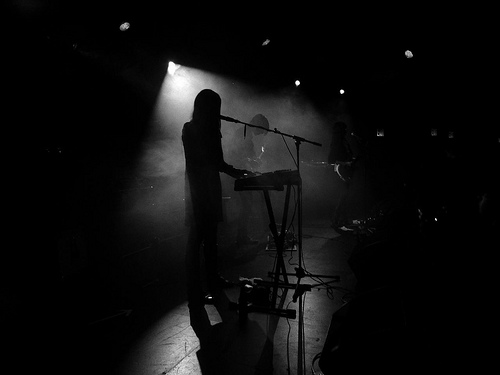
I always hate asking this question, but I feel like it applies in this case: what artists influenced this record?
: Robert Wyatt. He’s a huge influence.
I’ve always wanted to get into him but never h the chance. What’s a good place to start?
: Start with [the 1997 album] Shleep.
BC: [The 1974 LP] Rock Bottom is good too. He’s the most virtuosic amateur singer on the planet.
: There’s nothing amateur about it, but he is an amateur singer.
BC: Well, it’s just not perfect.
: His voice is like an instrument. You can tell he’s not attached to any one idea of what a singer should ‘sound like.’ It’s crazy. He’s so good.
BC: Rock Bottom is from around when he fell out of a window and couldn’t use his legs. He couldn’t play drums on it, so it’s all keyboards and minimal. It’s so beautiful. He writes songs that are very emotionally resonant and melodically interesting, which is a major inspiration for us.
: He’ll start climbing and it’ll never resolve the way you think it might. He goes everywhere with it, yet it makes perfect sense.
BC: I’m trying to think of something that’s really relevant to our music.
: Well, that “Chain†song that we did, the cence on it was inspired by that girl from American Idol, Fantasia.
BC: And the auto-tune effect on the beat is totally like that song “Sensual Eruption†by Snoop [Dogg]. We just didn’t make it sensually erupt as much.
On the electronic side, are there any producers that you’re particularly into?
BC: Sleeparchive is probably our favorite.
: I saw him at Tonic at 3 in the morning. It was brilliant.
BC: He isn’t weird so much as groovy. That song “Amaranth†is obviously very inspired by Gas. We like really beautiful, spaced-out stuff like that. On the production side, we’re really into Eno and Can, as filtered through our experiences. We don’t really listen to Cocteau Twins, even though people keep assuming that.
: I’ve never owned a Cocteau Twins record. People even said that about On!Air!Library!.
BC: Well, when we gave Robin [Guthrie] “My Cabal†to remix, it was basically our demo. That was inspiring to us–to hear our music in that sort of British context.
Are you having anyone else remix songs from this record?
BC: We’ve got some. We just don’t want to give our songs to people. [Laughs] Mark [Clifford] from Seefel is going to do one, and Justin Brorick of Jesu is doing one. I can’t wait to hear that one. We love, love Jesu. That Conqueror record was a big influence on us. It was such a hunt to track him down. Oh, Simone [Pace] of Blonde Redhe is also doing a remix. Nobody did a remix that was great, too. We’re gonna do a singles series with everything.
No Hot Chip, though, so we’re kinda out of the loop.
